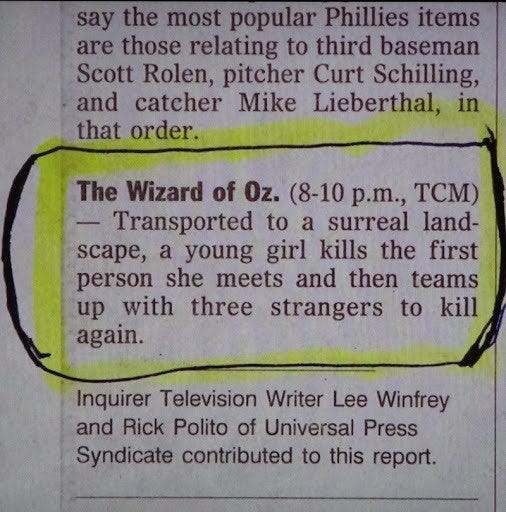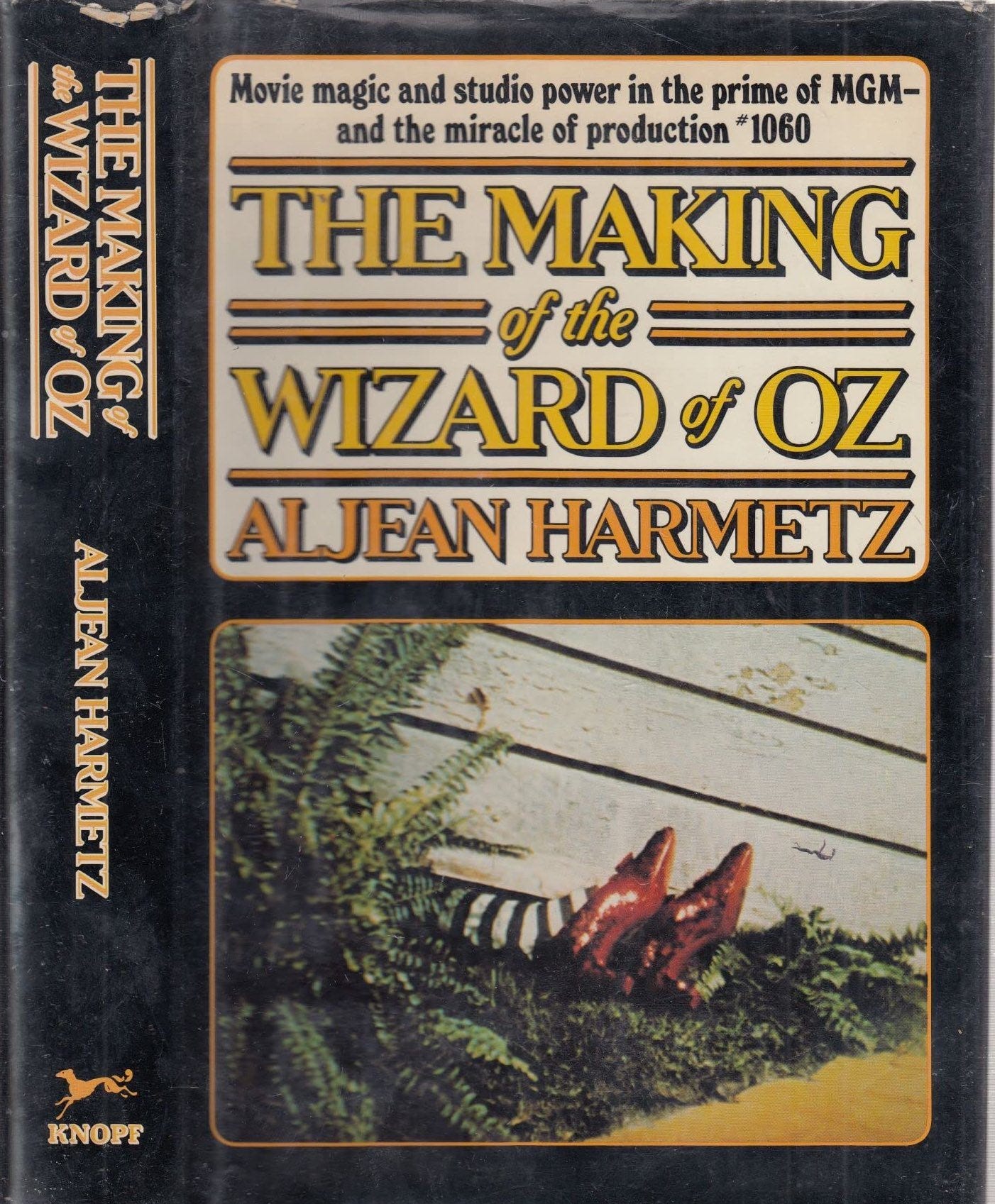Off to see the wizard
Re-watching The Wizard of Oz
Hey y’all,
Almost every Friday night, Meg makes pizza and we sit down with the boys and watch a movie. (Here’s what we loved last year + her recipe.) We’ve had a particularly good streak of classics in the past 3 Fridays: Mary Poppins, Tron, and The Wizard of Oz. Two movies I’d never seen before and one movie I hadn’t seen in at least a decade.
The Wizard of Oz brought up completely unexpected waves of emotion in me. I was crying by the time Judy Garland hit the first few notes of “Over The Rainbow.” I don’t know where, exactly, this reaction came from. I remember watching the movie as a kid, but I didn’t realize how the movie had dug into me, somehow. (The most vivid memory of the movie I have comes from adolescence: syncing it up Pink Floyd’s Dark Side of the Moon.) Where did these feelings come from?
I spent most of my Saturday reading Aljean Harmetz’s 1977 book, The Making of the Wizard of Oz. The movie was a studio “prestige” picture, intended to make a splash, but never really expected to make money. It did okay at the box office when it came out just a few weeks before WWII in 1939, but it was dominated at the Academy Awards by Gone With The Wind. It was one of the first musicals with the songs integrated into the plot, but it didn’t make that much of a cultural impact or turn any profit or become the classic it is now until the mid-1950s when it started being aired on television every year.
The movie was adapted from L. Frank Baum’s The Wonderful Wizard of Oz, a book that was almost four decades old and had sold over a million copies. (It came out in 1901, around the same time as Freud’s The Interpretation of Dreams.) The movie cost a small fortune to make, and over the course of its production, it went through ten writers and four directors, poisoned one Tin Man out of commission, put The Wicked Witch of the West and her stunt woman in the hospital, and caused the terrier playing Toto to have a nervous breakdown. (Not to mention the fate of Judy Garland.)
In the book, Dorothy gets transported to Oz within the first few pages. The brilliant invention of the movie is to show us Dorothy’s Kansas first, and populate it with characters that will be echoed later — Miss Gulch on her kickass bike, the three farmhands, and the fortune teller, who, in Oz, become The Wicked Witch, The Scarecrow, Tin Man, and Cowardly Lion, and The Wizard, respectively.
In the book, Kansas is grey, but on-screen it’s not black and white, it’s sepia: they actually dyed the film to look muddy and brown, which makes an even bigger impact when she opens the door into the Technicolor Oz.

There are other additions and subtractions, but the addition that rings the falsest to me is the emphasis on “there’s no place like home,” which was invented by the producers and screenwriters to give it a syrupy, warm ending.
John Waters has joked about it many times:
“I was the only kid in the audience who couldn’t understand why Dorothy would want to go home. It was a mystery to me. To that awful black-and-white farm, with that aunt who was dressed badly, with smelly farm animals around when she could live with winged monkeys and magic shoes and gay lions!”
Maybe the only kid, but not the only adult. As another song that Judy Garland sang put it:
How ya gonna keep 'em down on the farm
After they’ve seen Paree’?
How ya gonna keep 'em away from Broadway
Jazzin around and paintin’ the town
How ya gonna keep 'em away from harm, that’s a mystery
They’ll never want to see a rake or plow
And who the deuce can parleyvous a cow?
How ya gonna keep 'em down on the farm
After they’ve seen Paree’?
Salman Rushdie, in his 1992 essay on the film, calls “There’s no place like home” the “least convincing idea in the movie,” which results in “a cloying ending that seems to me fundamentally untrue to the film’s anarchic spirit.”
(One should mention here that in the 6th of the 14 Oz books, Dorothy gets her aunt and uncle to move to Oz with her.)
Rushdie points out that at the heart of The Wizard of Oz is a “great tension” between the “two dreams” of “leaving” and the dream of “roots.” The tension between staying put or getting out. (See: Pirates and Farmers.) Rushdie suggests that “Over The Rainbow” should be the “anthem of all the world’s migrants,” and while the ending tries to tell us one thing, it’s the power of the song’s message that wins out. (It’s easy to forget that Oz is a musical, and a musical in which the songs say as much or more as the dialogue.)
It is this tension between staying put and leaving in the movie that really pulled my gut strings. When I was a kid, I literally lived in the middle of a cornfield, and all I wanted was to get out of there, gather a gang of friends, journey to the metropolis, and go see The Wizard. I was — I am! — Dorothy. A thought that somehow, up until the writing of this very sentence, my dumb brain had never registered.
Another great tension in the movie is the one between innocence and experience, naivety and cynicism. I love the Wizard’s speech at the end, which is both a dodge by a con man and a sendup of all things pompous and haughty. I especially love what he says to the scarecrow, who wants a brain:
Why, anybody can have a brain. That's a very mediocre commodity! Every pusillanimous creature that crawls on the earth or slinks through slimy seas has a brain! Back where I come from, we have universities, seats of great learning where men go to become great thinkers. And when they come out, they think deep thoughts — and with no more brains than you have. But! They have one thing you haven't got! A diploma!
Why did I ever want to go see The Wizard? When I was younger, I wanted so badly to become an author — and that meant to be authorized.
If only I could find the right person to authorize me! If only I could go meet The Wizard!
But eventually I learned the only person who could authorize me… was me.
Being a writer is an act of perpetual self-authorization.
No matter who you are.
Only you can authorize yourself….
No one else can authorize you.
No one.
(From Verlyn Klinkenborg’s excellent Several Short Sentences About Writing.)
All of this to say: If you’ve never seen The Wizard of Oz, give it a watch. At the very least, you’ll discover how much of its DNA is in the movies of the second half of the 20th century (and beyond.)
I’m reading Ander Monson’s new book on Predator, a movie I’ve watched dozens of times. He writes that when we check in with old beloved media, “we can crack open the shells of who we used to be… We are still in there. It only takes a movie or a game to unlock us.” He says that he watches Predator to watch himself.
Monson’s case for re-watching the movies of his youth reminds me of Joan Didion on why she keeps a notebook:
I think we are well-advised to keep on nodding terms with the people we used to be, whether we find them attractive company or not. Otherwise they turn up unannounced and surprise us, come hammering on the mind's door at 4 a.m. of a bad night and demand to know who deserted them, who betrayed them, who is going to make amends. We forget all too soon the things we thought we could never forget. We forget the loves and the betrayals alike, forget what we whispered and what we screamed, forget who we were.
What movies do you watch to watch yourself? What’s an old favorite you return to over and over? What do you think of The Wizard of Oz? Tell us in the comments.
xoxo,
Austin







* I watch Interstellar on my birthday every year - I love the soundtrack and the plot (but laugh at all the scenes with Michael Caine in, annoyingly). It tells me about deep time.
* As a kid, I watched Beaches with Bette Midler endlessly and would cry if I watched it again, I know. It inspired me to move to New York, along with Chorus Line which was not very infant appropriate - had a song about STDs! Movies have so much unconscious power.
* Two films that inspired me to write: Dead Poets' Society and Back to the Future. I can't underestimate how much the silver screen 'set' me and my aspirations as a young human
Loved this post, Austin x Julia
Austin, thanks for this. I love it when I get convergence of message from different sources. Part of this morning's reading was a poem by Noël Coward.
"Nothing Is Lost"
Deep in our sub-conscious, we are told
Lie all our memories, lie all the notes
Of all the music we have ever heard
And all the phrases those we loved have spoken,
Sorrows and losses time has since consoled,
Family jokes, out-moded anecdotes
Each sentimental souvenir and token
Everything seen, experienced, each word
Addressed to us in infancy, before
Before we could even know or understand
The implications of our wonderland.
There they all are, the legendary lies
The birthday treats, the sights, the sounds, the tears
Forgotten debris of forgotten years
Waiting to be recalled, waiting to rise
Before our world dissolves before our eyes
Waiting for some small, intimate reminder,
A word, a tune, a known familiar scent
An echo from the past when, innocent
We looked upon the present with delight
And doubted not the future would be kinder
And never knew the loneliness of night.